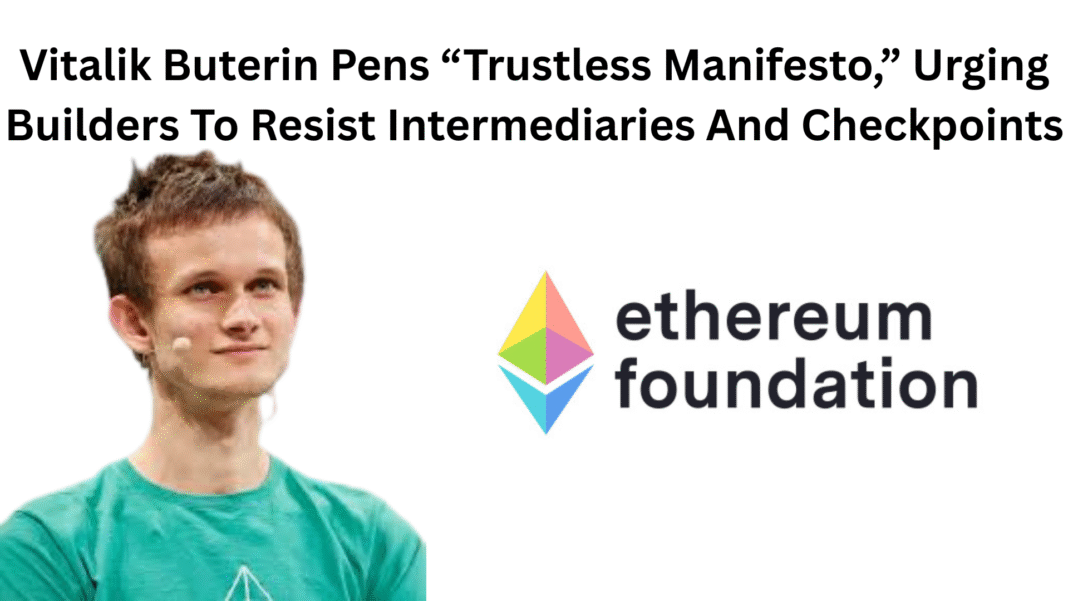The new “Trustless Manifesto,” written and signed by Ethereum co-founder Vitalik Buterin, aims to preserve the fundamental principles of decentralisation and resistance to censorship while encouraging builders to avoid adding middlemen and checkpoints for the sake of adoption.
Vitalik on Trustless Manifesto
According to the Trustless Manifesto, which was also written by researchers Yoav Weiss and Marissa Posner of the Ethereum Foundation, cryptocurrency platforms give up trustlessness as soon as they incorporate a hosted node or centralised relayer.
They explain that although this seems harmless at first, it turns into a habit, and the protocol becomes less and less permissionless with each checkpoint.
“Trustlessness is not a feature to add after the fact. It is the thing itself,” the Ethereum Foundation members said in the manifesto published Wednesday. “Without it, everything else — efficiency, UX, scalability — is decoration on a fragile core.”
“When complexity tempts us to centralise, we must remember: every line of convenience code can become a choke point.”
The foundation wrote, “Ethereum was not created to make finance efficient. It was created so people could coordinate without trust in intermediaries. The manifesto is a statement of those values:
credible neutrality, self-custody, verifiability, and resistance to “convenient” centralisation.”
Also Read: Kevin O’Leary Warns Ethereum’s $1,000 Gas-Fee Spike Exposes Critical Scaling Problem
The aim of the manifesto
Some Ethereum layer 2s have come under fire for abandoning decentralisation in favour of scalability to hasten adoption, even though the manifesto wasn’t directed at any specific individual or business.
Buterin, Posner, and Weiss stated, “We measure success by trust reduced per transaction, not by transactions per second.”
The Amazon Web Services catastrophe last month was a direct example of the dependence on middlemen. Arbitrum and Optimism had more resilience, remaining fully operational with multi-cloud configurations, while Coinbase’s Base chain lost over 25% throughput when its AWS-hosted sequencer went down.
The manifesto was signed by a number of additional members of the Ethereum ecosystem, including Tom Teman, a member of the Ethereum Foundation, and the anonymous cryptocurrency researcher hitas.base.eth.
Buterin has advocated several other manifestos before the Trustlessness Manifesto. He promoted account abstraction, zero-knowledge proofs, and other encryption techniques that improve privacy in an effort to make “Ethereum cypherpunk again.”
Ethereum Foundation development
To coordinate “policy efforts” and inform lawmakers about the ecosystem, major Ethereum stakeholders founded the Ethereum Protocol Advocacy Alliance (EPAA).
The Ethereum Protocol Advocacy Alliance was established earlier this month, and the EPAA emphasised how important it was to do so in order to counteract the seeming “outsized influence” that centralised cryptocurrency companies had on government.
It coincides with Ethereum’s recent significant institutional adoption, which began with the July 2023 launch of spot Ether exchange-traded funds and, more recently, a growing trend of public firms buying the cryptocurrency to bolster their balance sheets.
To make the network as decentralised, independent, and resistant to censorship as possible, the Ethereum Foundation and core developers are still committed to completing Ethereum’s technical plan.
Also Read: Ethereum Founder Vitalik Praises Polygon And Co-Founder Sandeep As ETH Governance Tensions Rise


